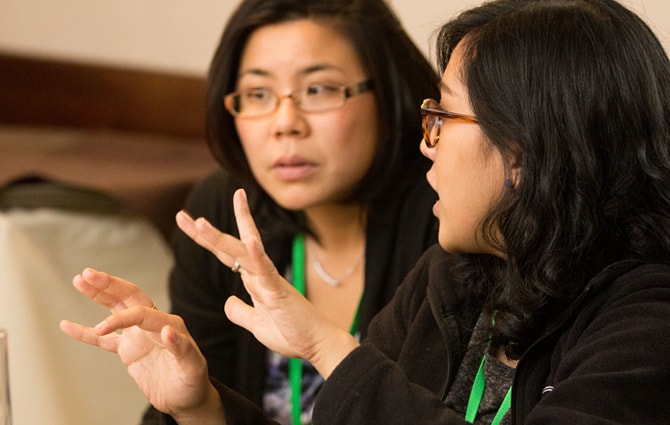Using Data Conversations to Accelerate Impact and Improve Outcomes

Data provides hints, not answers. But when brought together with context and conversation, data can become actionable insights that translate into powerful changes for students.
Numbers and scores provide little insight unless there’s a strategy for analyzing the data, a means for sharing it among the right colleagues, and a system for making informed decisions for change. Sometimes people look at data alone, but often educators and school leaders engage with data as part of a “data conversation” with one or more teammates working together to unpack what the data means and decide what to do about it.
As an educator or school leader, how can you foster a culture that is receptive to data conversations? How can you facilitate better conversations around data? How can you use tools and resources for greater impact? In short, what makes data meaningful and actionable?
Creating a data-friendly culture.
“The key to creating positive, data-driven cultural change in your school is to build love and trust around data. Teachers have to know that you’re there to help them get better.”
— Doug Rawlins, Principal, Panhandle Elementary School, From Schoolzilla Case Study
Analyzing data and effectively using it to make informed decisions takes teamwork, consistent and open communication with teachers and students, and a deep understanding of how to use data, when, and why.
Imagine for a moment that you’re responsible for assessing your district’s data. Every week you spend hours and hours creating reports to show each student’s progress and challenges. You know how important the information is, how useful it can be for impacting student achievement, but no one is looking at your reports. No one is analyzing the information or using it to make decisions. Should you continue to exert effort if it’s not doing anything productive for kids? What other levers can you pull for change?
Many educators have access to data insights, information and reports that provide them with detailed information about their students, but as shown in the example, not everyone knows what do with their data. What prompts educators to use data? For some, the answer is simple: “I need it and depend on it”. These educators spend hours working in spreadsheets trying to make the most data-driven decisions possible. For others, it’s because “My principal wants to see it”, or “Our school had a data day”, or even “My school’s data coach walked me through it”. While the answers vary, each encompasses the same underlying theme: I look at data because I need to make decisions with colleagues.

As district administrators, part of developing a data-driven culture is engaging your teams in the data, so that your reports aren’t just theoretically valuable, but are authentically used. By facilitating conversations about data, you’re fostering an environment where educators are exploring the data, gaining deeper understanding about what it means and why it’s important, and building an instant interconnectedness amongst school leaders, teachers, and their data.
Levers to drive data conversations.
“Now that [the data] is there and it’s available for everyone, [teachers] are able to really dive in and not spend time analyzing, but spend time interpreting and using data to plan. We had much more meaningful conversations in the very beginning part of the year because the data was so readily available.”
— Jan Faraguna, Director of Analytics, Rocketship Education, From Schoolzilla Case Study
Technology has the potential to provide a platform for making data conversations a seamless part of everyday activities. Educators are enabled with data that is visible, accurate, explorable, complete, and timely. The capability to share data among district leaders and teachers creates a forum for discussion. Educators can write notes about what they see, synthesizing the information, generating feedback, and developing a strategic plan to take action.

Developing a collaborative environment where school leaders can openly discuss their data cultivates deeper relationships amongst colleagues and builds understanding about why decisions are being made, as well as an educator’s value in contributing to the solution and willingness to change practice for formative improvement. Here are strategies I have learned from working with schools at Schoolzilla that you can use to fuel data conversations:
- Data Kudos: Create a system to congratulate colleagues in your district about a data success; this encourages them to feel successful while gaining buy-in from your educators.
- Data Reflections: Encourage educators to consistently reflect on their data, so they understand it, own it, and act on it. One technique is to schedule meetings with your teachers or school leaders, sending out questions ahead of time, so they can reflect on what the data is telling them and set goals for the next quarter.
- Data Inbox: Share key pieces of data with your stakeholders. If there’s a report that is crucial to educators, share it with them, whether it’s through email, school mail, or even on a bulletin board in the staff lounge.
- Create a Shared Language: Infuse data into your everyday conversations to help educators understand data as the missing piece of the puzzle. Encourage educators to look for evidence, corroboration, and triangulation by answering these key questions:
- “What did I see?”
- “What data support or refute that observation?”
- “What’s my hypothesis of why that occurred?”
- Plug into a Network: Some people who are trying to champion data at their school are isolated. They don’t have anyone to discuss what’s working, what’s not, and what they could be doing differently. Connect with other data-driven leaders by starting a Professional Learning Community, or PLC, within your school to focus on data reflection and action.
There are many resources to help connect data-minded educators to share and solve problems collaboratively. Schoolzilla’s Data Champion Summit empowers data champions to connect, build relevant, timely skills that can be leveraged immediately to address current challenges, and take action. Data Champion Summit offers a unique opportunity to help schools engage with their teams by helping those teams have great data conversations.
Making your data conversations actionable.
“Once [data] is easy to see, it’s easy to know, and do something about it.”
— Richard Bowman, Chief Information and Strategy Officer, Santa Fe Public Schools
In a recent case study, Chris Haid explored how data helped reduce summer learning loss at KIPP Chicago. After administering the fall assessment, Haid reflected on his data and saw that third grade students had fallen into the summer reading slump. For the administration of KIPP Chicago, it did not seem plausible that students would regress in their studies with only six to eight weeks off for summer break. But the data was conclusive—there was a definite loss. This data prompted his team to take a closer look at how they were structuring class time after the year-end spring assessment. Acting on the data, they made the decision to place extra emphasis on delivering more purposeful, objective-driven teaching following the spring assessment; and ensured that teachers were instructionally ready from day one with all operational systems up and running so they could dive right into purposeful teaching and counter the effects of summer learning loss. The results of these data-driven decisions were both powerful and tangible for KIPP Chicago, “We saw less summer loss this year, nearly none in almost every class.” Haid said.

It’s not about the data, it’s what you decide to do with it. There are key steps to getting your district data-ready. The combination of strong data tools and fostering a robust data culture results in data conversations, and ultimately action leading to positive change for students.
- Can You Learn Data Science on the Job?
- A Data-Driven Transformation in Missouri’s Largest District
- Infographic | Empowering Principals with High-Quality Data
Leo Bialis-White, PhD is the Vice President of Impact and People at Schoolzilla, PBC. Follow Schoolzilla on Twitter @Schoolzilla.
Stay in-the-know with all things EdTech and innovations in learning by signing up to receive the weekly Smart Update





0 Comments
Leave a Comment
Your email address will not be published. All fields are required.